For many years El Salvador was known as one of the most dangerous places to travel on earth. With the highest per capita murder rate in the world, the small Central American country seemed doomed to descend further into corruption and chaos. But this would all change in 2019, with the election of a young man named Nayib Bukele to the presidency.
HISTORY OF EL SALVADOR
El Salvador has, for a long time, had the reputation of being a dangerous place. The Central American region connects South America with Mexico and the United States and has been a corridor for all manner of illegal activities. With Columbia and Venezuela to the south and Mexico to the north, smugglers and criminal organisations, often navigated through El Salvador. Wealthy powerful syndicates would bribe or extort state and federal officials, law enforcement, border security, and so on, to establish their operations within El Salvador. Naturally this opened opportunities for criminals already operating within the country.
El Salvador is one of three countries which make up the Northern Triangle, alongside Honduras and Guatemala. During the Cold War, the strategic importance of this region led to a series of proxy wars and hostilities between US and Soviet backed governments and regimes. From the 1950s onward, communist intellectuals from Europe began to spread ideologies such as Marxism and Critical Theory throughout central and South America. Due to a variety of factors such as existing corruption, poverty, and what was perceived as western imperialism, these communist ideas fell on fertile ground. What followed was a bitter struggle between Soviet, American, and CIA backed regimes, often all in hostility to one another. This would become known as the Central American Crisis; major unrest was present in practically all central and south America countries during this period, with particularly strong hostilities in Nicaragua, Honduras, Guatemala, and El Salvador.
A civil war in El Salvador beginning in 1979 would engulf the country. Fearing a communist takeover - as had happened previously in Nicaragua, the military began to plan a coup to seize the government, which had been controlled by the powerful US backed National Conciliation Party since 1961. The US backed party itself emerged in response to growing communist threats in the 1950s. A dictatorship was established in the years following, which the US understood to be the most efficient method of stopping Communism. The predictable response was an even more violent assortment of communist militia groups trying to take power, which led to anti-communist groups which received government funding to hunt and kill suspected communists. Throughout this period, both the communist and anti-communist movements - despite being backed by foreign powers - grew in popularity. Realising that the government was under threat, the US decided to swing their support to the military and their plans for a coup. Following the military victory in 1979, the same violence would continue under the newly formed Junta government.
This time it would be arguably worse. The Junta governments policies were confusing and clearly an attempt to hold power from the communists at any cost. Death squads were set out to hunt suspected members of the increasingly powerful FMLN communist movement - backed by Castro and the Soviets - while simultaneously the government plans included seizing farmland for use as collective communes. This caused increased anger both among the right-wing and the communists.
Both the Argentine and Chilean governments gave military training and aide to the Salvadorians. Argentina’s anti-communists had repelled Che Guevara’s revolutionaries, whilst Pinochet in Chile was seen as a hero by a large portion of his population. El Salvador was not so stable and Salvadorian anti-Communists turned to increasingly extreme tactics to hold back the growing revolutionary forces. Scorched-earth tactics were employed by the growing numbers of death squads, with a strategy to destroy the support base of the rebel factions, which included fear tactics, displacement, and in some cases the execution of civilians perceived as being pro-communist. Over the following years, communist resistance would grow so strong that the limited conflict would develop into a full-scale war. Although the anti-communist forces had more support, FMLN and other revolutionary groups appeared unstoppable.
The civil war - which would continue into the 1990s – became a prime causal factor for El Salvador’s reputation as a crime-ridden country. Decades of war weakened the economy and government and created a divided population.
Gangs and organised crime had always existed, however during the 1980s the level of sophistication and scale increased. This was, in part, thanks to the help of the CIA. As the war in El Salvador waged, another civil conflict was taking place in nearby Nicaragua. For the CIA, Nicaragua was seen as strategically important, and resisting the communist government - known as the Sandinistas - was a top priority. To depose the Sandinistas, the CIA would back the right-wing Contras in Nicaragua. To help with funding, the CIA would aid in the trafficking of cocaine, one of the Contras primary sources of income. These sophisticated networks sometimes ran through El Salvador.
While surrounded with much controversy, it could be argued that the CIA never foresaw this operation bearing the corruption it did. Given the complex networks run by the communists, it was seen as a necessary response. Some evidence suggests that the CIA did attempt to limit the Contras and keep them in line, but the corruption soon spread, the CIA had exposed the Contras to an income stream beyond their wildest dreams. Small gangs in Central America - notably in El Salvador - were exposed to drug trafficking as well. To make matters worse, Salvadorians who had migrated to the US during the war were sent back. Many of these Salvadorians had become involved in gangs, and upon returning they were exposed to organised crime that was remarkably profitable. These gangs - or Maras - soon turned against one another, resulting in increased violence.
CRIME IN COUNTRY
By the 1990s, organised crime became increasingly difficult to control across Central America. In El Salvador, returning refugees sent back from the US would frequently join one of two powerful gangs; MS-13, and Calle 18. These two gangs - initially formed as street gangs by Salvadorian refugees in California - were increasingly becoming the two most powerful forces in El Salvador. In 1995, the homicide rate in the country was shown to be 113 murders per 100,000 people. This made El Salvador arguably the most dangerous country to live in that was not currently in a state of war.
Beginning in the late 1990s, various attempts were made to curb organised crime from the top down. This would culminate in 2003 with a new policy known as ‘La Mano Dura’ - or ‘the iron fist’. With this implementation came new police powers, the expansion of the police force, and the ability for the military to assist the police force if necessary. First enacted by then-president Francisco Flores of the National Republic Alliance, the sweeping program came in response to public demand and was welcomed by the majority of the population in El Salvador.
Within the first year, the program had achieved the arrest of 20,000 people, thanks to the law allowing police to detain and arrest those who were suspected of working with gangs.
However, the successes of the campaign would be short lived. Although the campaign had emerged from a public outcry for state intervention - and despite the massive support it continued to have from the Salvadoran population - the ‘Iron Fist’ came under international scrutiny. Journalists, human rights groups, and other international NGOs began calling for reforms, claiming that the program was not actually helping the population, but resulting in unfair imprisonments and occasional extrajudicial killings by the police and military. In 2004, after just a year of the program, the Salvadoran Supreme Court Justice ruled the campaign to be ‘unconstitutional’, as international pressure continued to mount. The United Nations condemned the campaign, stating that it was causing overcrowding of prisons, and that it unfairly targeted young people.
Despite the best efforts of these international institutions, the program continued to have the support of the population, on both the political left and right. In 2006, despite pressure, President Antonio Saca attempted to continue the programs momentum, beginning what he called the ‘super firm hand’ campaign. Then, in 2009, the leftist revolutionary FMLN party was elected, led by President Mauricio Funes. Despite many disagreements with the outgoing party, Funes continued to back the anti-gang policies. In fact, after a series of attacks on bus passengers, Funes attempted to broaden the scope of the program, with what he called the ‘anti-gang laws’. These laws banned any gang affiliation, made legal acts undertaken on behalf of a gang illegal and punishable, and added prison sentences ranging from 3 to 20 years for affiliation with a gang. He also sent 2,800 troops from the military to work alongside the police force to stop crime.
During this same period, Funes government also attempted to implement a community program aimed at rehabilitation, helping victims of crimes, and keeping the streets safe, known as ‘Mano Amiga’, or ‘helping hand’.
Yet despite the best intentions of the government, the reforms aimed at curbing crime were always limited by some factor, be it international or internal pressure. This meant that even though the crime rate had been lowered, murders in El Salvador remained among the highest in the world. The only sense of security came in 2012, when crime rates dropped following a negotiated ceasefire between the MS-13 and Calle 18 gangs. Those in the police force and government believed that truces and ceasefires were momentary, not proper fixes. They were correct, when in 2014, the truce collapsed, and fighting broke out once again.
VIGILANTES
From 2014 onwards, with crime and murder still high, El Salvador began to witness a rise in vigilante groups. The most feared was known as Sombra Negra, or Black Shadow. Emerging in the late 1980s, the Black Shadow grew rapidly as crime in the country continued to grow. Staffed by police officers and soldiers, the group would become known for its brutal doctrine against gang members, including kidnappings, extreme torture, and psychological warfare. The group became known for wearing black uniforms or anthropomorphised costumes, driving in unlicensed vehicles, and taking part in military style raids. The group claimed the gangs were legitimate terrorists and were thus treated as such.
While details about the group remained in the shadows, international groups were quick to point the finger at the Salvadorian government, although they denied having any ability to control them. Pressure also mounted once again from within, with the Attorney General blaming the increase in gang violence on Black Shadow for inciting the gangs. Despite these claims, the population appeared to endorse the group. It would go on to expand operations into Nicaragua and Honduras.
BUKELE REFORMS
The policies of the Salvadoran government did indeed have an impact on crime, but the sheer scale of the gangs in the country meant that even the boldest of campaigns were still limited in effect. To truly lower the murder rate, El Salvador would need a leader willing to implement policies far harsher than before, and this would indeed come.
In 2019, Nayib Bukele would emerge as El Salvadors newly elected president. A nationalist, Bukele promised not only to go hard on crime, but to also remove harmful foreign influence from the country – he would call out the likes of the Soros Open Society Foundation and the UN. Bukele would go hard on crime and ignore the inevitable international condemnation that would come. His reforms would be broad, and the policies he enacted would allow for the arrest and imprisonment of anyone deemed suspect.
Historically, the president would usually come from one of the two major parties; the left leaning FMLN, or the right leaning ARENA. Bukele - who was once a member of FMLN - would instead run for president with the Grand Alliance for National Unity, or GANA, making him the first president from an independent party since the 1980s.
From the beginning of his campaign, there was heavy censorship and pushback against him. In 2018, after being kicked out of FMLN, he first attempted to start his own party, known as ‘New Ideas’. Immediately his party came under fire by both the FMLN and ARENA, they blocked any attempt to legitimise his movement, and any attempt to run for election. Soon thereafter, he turned to the Democratic Change party, but this too would be attacked. The Supreme Electoral Court intervened, effectively dissolving the party. This would lead Bukele to join GANA, from which he would win the presidency.
2020 POLITICAL CRISIS
Once in power, Bukele continued to meet strong resistance. From the outset he had made it clear that his ambition was to tackle gang related murders and crime. To reduce crime, the police and military forces would require more funding as part of the Territorial Control Plan. Bukele suggested a $109 million loan from the US to achieve this, yet in the legislative assembly, both majority parties - the FMLN and ARENA - staunchly opposed this request, giving various reasons such as militarisation of the police force, possible misuse of power, and so on. Neither Bukele’s New Ideas party, nor GANA held a majority in the assembly. In the days that followed, chaos would ensue in the assembly, with both parties gridlocking any final decision on the loan in an attempt to block it. This would become known as the 2020 El Salvador Political Crisis.
On February 6th, Bukele invoked Article 167 of the constitution, calling on the Council of Ministers to convene on February 9th to vote on the loan. This article itself was designed for convening extraordinary sessions in the case of national emergency, which Bukele clearly saw to be the case. On February 9th however, less than half of the voting members of the legislative assembly had shown up. Foreseeing what was about to happen, Bukele met with several military leaders that morning to ask for their support.
Then to the surprise of everyone, Bukele entered the legislative assembly room, accompanied by 40 military personnel, and sat in the chair of Assembly President Mario Ponce. He then spoke up, saying “It’s clear who’s in control of the situation and were going to put the decision in the hands of God”. He then began to pray, and after several minutes left the assembly. Outside he was met by the others, to who he said that “We’re going to give these scoundrels a week, and if they haven’t approved the plan by then, we convene them again”.
News of this immediately spread across the country and abroad. As expected, international organisations including Amnesty International and the UN began to criticise Bukele for his action. Small protests then began to occur at the University of El Salvador. In contrast, many Salvadorans took to social media to praise Bukeles actions, saying that he was doing what had been put off for so long. By the next week, crowds of supporters were gathering outside the legislative assembly, demanding that they approve the loan.
Both major parties - along with the Supreme Court - attempted to push back against Bukele, calling on citizens to reject his actions as an anti-democratic attempted coup, and requested a meeting of the Organisation of American States. Yet as assembly members failed to show up to vote, Bukele remained unmoved, stating on twitter that if deputies did not attend, then Article 87 would be invoked, which allows for the people to begin an insurrection to restore constitutional order.
The militaristic action would continue into 2021, with Bukele then ordering forceful military arrests of citizens breaking lockdown protocol during the 2020 pandemic. In 2021, both the Attorney General and the constitutional court used this as justification to investigate Bukele for corruption, although it seems as though the primary motive was the 2020 loan incident. This would lead into the 2021 Political Crisis.
2021 POLITICAL CRISIS
On February 28, 2021, the Salvadoran Legislative Election saw Bukeles New Ideas party win 56 of the 84 seats, giving him a majority, and on May 1st a new president of the legislative assembly was elected - Ernesto Castro. Following this vote, the assemble then made an astounding decision. A vote was held to remove all five judges of the Supreme Courts Constitutional Court, as well as the Attorney General. It was noted that all these individuals had been staunch opposition to Bukele and his policies, and with a vote of 64 to 19, they were all removed from their positions. Replacing them would be five new judges, most of whom were in favour of the harsh-on-crime policies the government was attempting to pursue.
Once again, this event created international outrage, while simultaneously having widespread support from the Salvadoran population. US Vice President Kamala Harris, Secretary Anthony Blinken, as well as the UN and European Union all condemned Bukele’s actions as a threat to democracy, whilst many Salvadorans believed that the judges had held power only to slow progress in the country. Bukele himself would respond to Anthony Blinken - a regular critic of Bukele’s policies - noting that four months into the Biden administration, the US had pulled support for the Salvadoran law enforcement which had been running during the Trump presidency, and that the US now only supported the civil liberties of the gangs. Such tweets by Bukele were popular amongst the Salvadoran people and helped further establish him as a populist leader.
2022 GANG CRACKDOWN
All of this would pave the way for Bukele’s biggest anti-crime action to date, commonly referred to simply as the 2022 Salvadoran Gang Crackdown. In April 2020, following a two-day killing spree by gangs in prison, murdering 77 people, Bukele ordered prisons to go into lockdown, in which inmates would be locked in their rooms 24 hours a day. This reduced murders in prison, while on the streets Bukele’s anti-crime policy was having positive results. However, the murder rate was still high, and the country still extremely dangerous.
On March 25th to 27th, 2022, 87 people were murdered on the streets, including 67 just on March 26th. The random murders were attributed to the MS-13 gang. The government believed that the gangs were either responding to the military having seized two bus routes which had regularly been used for drug trafficking, or the gangs were trying to threaten the government.
Regardless, on March 27th, the legislative assembly decided to take extreme action. A so called ‘state of exception’ was declared. Law enforcement could now monitor people without warrants, detain individuals not yet charged for longer periods of time. Bail and house arrest were revoked, rights of legal counsel and association were suspended, and jail times for gang lords were extended from 9 years to 55 years. The age of criminal responsibility was also lowered from sixteen to twelve, and anyone found disseminating gang messages - including through the media - could face ten years in prison.
This response plan sprang into action immediately that same day. The police and military were called up; houses were raided, checkpoints were set up, and travel was restricted unless there was a legitimate reason and ID could be provided. By the end of that same day - March 27th - 576 people had been arrested, and by the end of the week the number had grown to 6000. Two months later - on May 25th - Bukele announced that 34,500 people had been arrested as part of the campaign.
Following international criticism for prison overcrowding in July that year, Bukele announced he would build a new prison - one of the largest in the world known as the Terrorist Confinement Centre - which would house 40,000 inmates. This would be necessary, as thousands more suspected gang members were being arrested every month.
As the crackdown went on, the murder and crime rates plummeted. In 2023, it was reported that the homicide rate had dropped to just 2.4 murders per 100000, a huge improvement from the recorded homicide rate of 106 per 100000 recorded in 2015.
The final push under Bukele would be a siege on December 3rd, 2023. 10,000 military personnel were deployed to the city of Soyapango. Here, they surrounded the city until they had captured all suspected gang members. As of December 2023, it was reported that 75,000 suspected gang members had been arrested since March 2022.
The campaign would continue under the control of Bukele until December 7th 2023, when it was handed over to Claudia Guevara. Bukele has stepped back from the spotlight to prepare for his 2024 re-election campaign, however the war against the gangs continues.
THE COUNTRY TODAY
In spite of international outrage, Bukele’s policies remain incredibly popular amongst Salvadorans, who have seen a dramatic fall in crime rates, and an overall increase in safety. In 2022 a Gallop poll found that 91% of Salvadorans supported Bukele’s policies, with 78% being strongly in favour of them. Even the countries Archbishop voiced his support for the war on crime.
Countless testimonies and interviews with Salvadorans reveal that the atmosphere of the entire country has changed for the better. Where once gang members openly operated on the streets, they have largely disappeared. Places where crime and murder were high are now safe. Areas where citizens feared reprisal attacks if they crossed into another gang’s territory are now far safer also.
The policies have been so successful that throughout Latin America, many politicians are becoming inspired to take up their own campaigns, including Honduras, Costa Rica, Guatemala, Peru, and Chile. Even the two gateways into Central America - Colombia and Mexico - have shown an increase in right-wing pro-military intervention to clean up the streets. This event in the small country of El Salvador may yet have a bigger effect than expected, and may result in positive change across Latin America.
Donate:
Bitcoin (BTC): bc1qytnwn0ht8p98cxs420h5kjf738unzauqd7f0rq


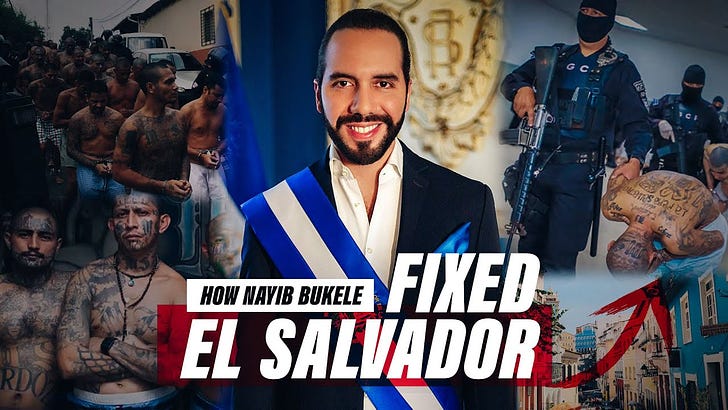



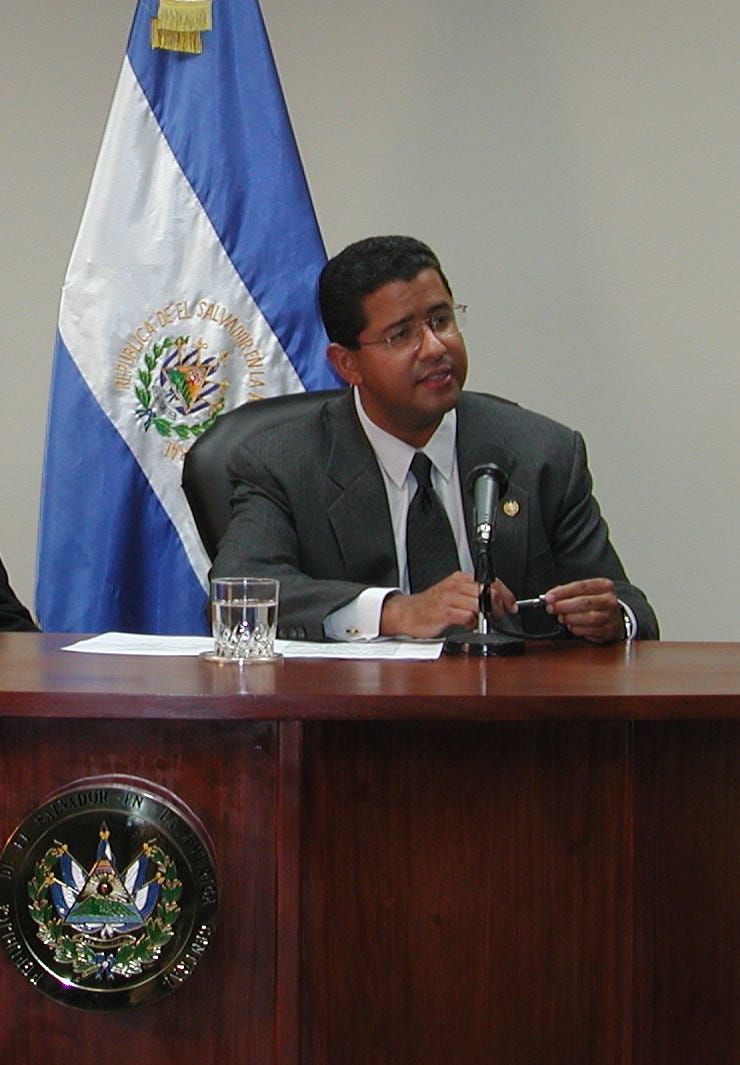
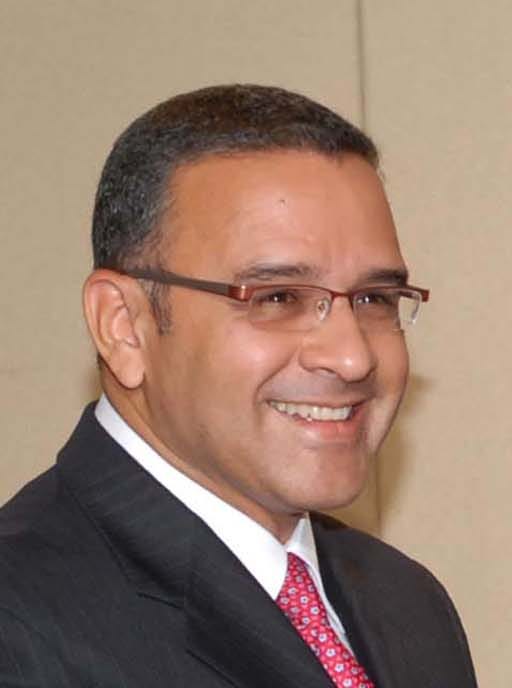


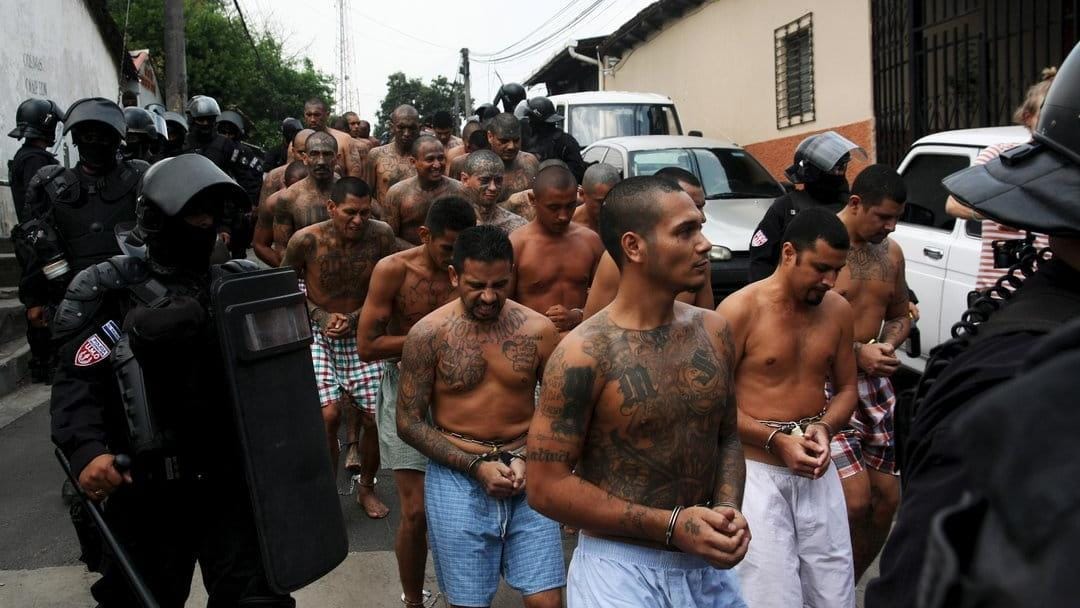

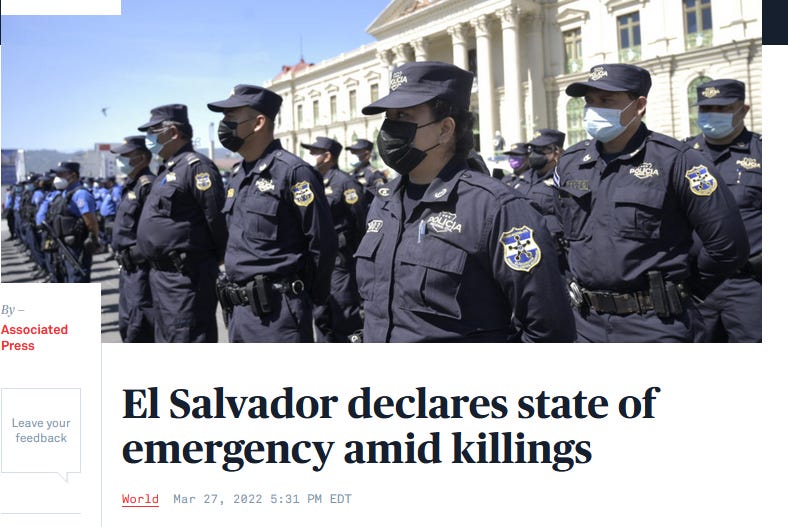

Thank you so much for this very informative article.
Just wow! On one hand, these actions in the wrong hands would signify a disaster. On the other, what were the alternatives? All well that ends well. Although Pinochet and Franco would testify that, regardless of the results, no good deed goes unpunished.